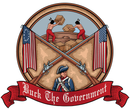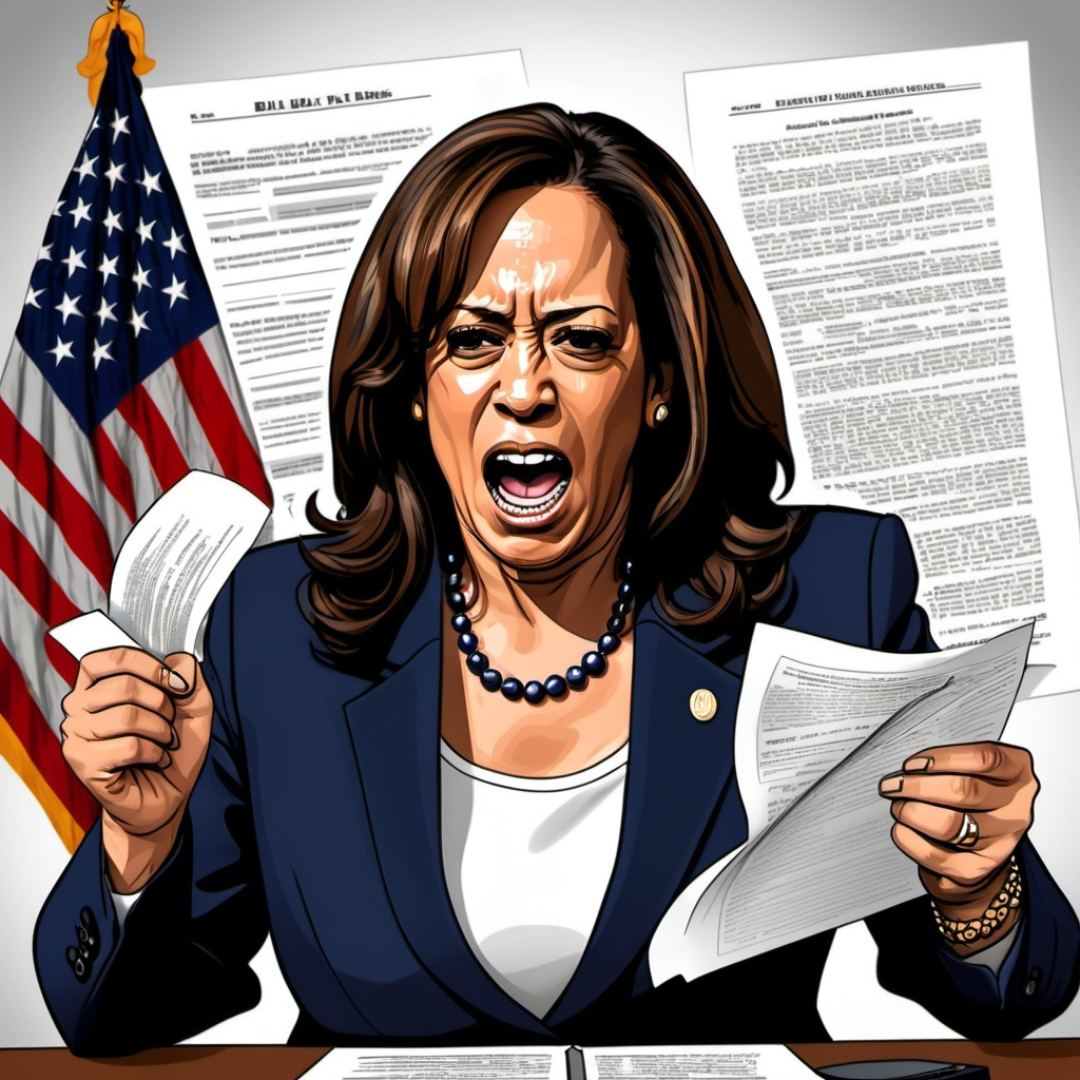In recent years, discussions by leftist DemonRats and the corrupt media surrounding the regulation of social media have grown louder, driven by concerns over "misinformation" (truth), online extremism (conservatives speaking truth), and the influence of tech giants on public discourse (making sure they only favor the marxists in power). However, some of these regulatory proposals have sparked controversy, particularly when they appear to threaten core American principles like freedom of speech and expression. One such controversy surrounds Vice President Kamala Harris’ public statements regarding social media regulation. Harris has made it clear that she supports holding social media companies and their executives accountable for allowing certain types of content on their platforms, going as far as suggesting punitive measures for those who fail to comply with potential government mandates. These statements have led to growing concerns about the potential for government overreach, censorship, and the erosion of First Amendment rights in the United States.
Kamala Harris’ Views on Social Media Regulation
Kamala Harris has long advocated for tighter regulation of social media platforms. As "misinformation" (truth), particularly regarding COVID-19, the 2020 election, and vaccine skepticism, spread across platforms like Facebook and Twitter (now X), Harris has called for stronger government intervention to curb the dissemination of what she deems harmful content (truth). Her focus has not just been on misinformation (truth), but also on hate speech (criticism of corrupt politicians and media) and the role social media plays in amplifying "extremist views" (truth).
In her role as Vice President, Harris has taken a more direct stance, suggesting that social media platforms and their executives should face consequences if they fail to regulate content in accordance with governmental guidelines. This has been going on behind the scenes since Emperor Obummer was in office but now, Harris is saying it publicly.
One of Harris’ most controversial statements came in 2023 when she openly discussed the possibility of holding social media executives legally liable for allowing "harmful content" (truth) to spread unchecked on their platforms. She implied that social media companies must take more aggressive steps to remove "misinformation" (truth) and "hate speech" (truth), and that failure to do so should result in fines, penalties, or even criminal charges for platform owners and executives.
Censorship Concerns: The Threat to Free Speech
Harris’ proposals have sparked widespread debate about the implications for freedom of speech and our Constitutional Republic in general. Critics argue that government-enforced censorship of social media platforms would violate the First Amendment, which protects the right to free expression. The notion of punishing social media executives for failing to remove certain content raises concerns about who would determine what qualifies as harmful or illegal speech and how such decisions would be enforced.
1. The Risk of Overreach:
One of the primary concerns is that Harris' proposals could lead to government overreach. If the federal government begins dictating what can and cannot be said on social media platforms, it raises the specter of authoritarianism. The government could abuse its power to silence dissent, suppress unpopular opinions, or target political adversaries. In this scenario, social media platforms would no longer serve as open forums for free expression but would instead become tightly controlled spaces where only (marxist) government-approved narratives are allowed.
2. Subjectivity of Harmful Content:
Another critical issue is the subjective nature of what constitutes "harmful" or "misleading" content. While there are clear cases of illegal content—such as incitement to violence or child exploitation—there is much gray area when it comes to misinformation or hate speech. What one group of people may consider dangerous misinformation could be seen by others as legitimate political discourse or even the truth. If the government is granted the power to censor certain types of content, it risks encroaching on the freedom to express minority or dissenting viewpoints, which is essential to a functioning Constitutional Republic.
3. Precedents for Future Censorship:
Harris’ proposals also raise concerns about the precedent it could set for future administrations. Once the government is given the power to punish social media companies for failing to censor certain content, it would be difficult to reverse that power. Future administrations, regardless of their political orientation, could use these new powers to suppress speech they disagree with. This slippery slope could lead to increased governmental control over all online discourse, eroding the very foundations of free speech and the open internet.
The Role of Social Media Platforms:
Social media platforms like Facebook, Twitter, YouTube, and others have become modern-day public squares, where people from all walks of life can voice their opinions, share information, and engage in debate. These platforms are not just spaces for private conversation; they are where political movements are born, where injustices are exposed, and where people can challenge government narratives. Unfortunately, all major platforms (other than X) are run by the corrupt deep state.
Critics of Harris’ stance argue that regulating these platforms to the extent she proposes would severely undermine their role as open forums for public discourse. If social media platforms are coerced into adopting strict content moderation policies to avoid punishment, they may over-censor in an attempt to comply with government demands. This could lead to the removal of vast amounts of legitimate content, stifling free expression in the process.
Additionally, holding social media executives personally accountable for the content on their platforms creates an environment of fear and uncertainty. Instead of fostering innovation and encouraging free discourse, it could lead to self-censorship, with platform owners erring on the side of caution to avoid legal ramifications. This chilling effect could extend to users as well, as they may hesitate to post or engage in controversial topics, fearing that their content could be removed or flagged.
Implications for Democracy and the Marketplace of Ideas
A key argument against Harris’ proposals is that they contradict the principles of a free and open society. In a democracy, the marketplace of ideas—the free exchange of opinions and information—is essential for informed decision-making. The First Amendment was designed to protect even unpopular or controversial speech, recognizing that the best way to counter harmful ideas is not through suppression but through more speech and open debate.
Forcing social media platforms to censor content on a large scale could have the opposite effect: rather than exposing harmful ideas to public scrutiny and debate, it would drive them underground, where they may fester and grow without challenge. Moreover, it would set a dangerous precedent for limiting political discourse, as future administrations could use these censorship powers to target their ideological opponents.
Legal Challenges to Censorship Proposals
Harris’ push for stricter social media regulation and punitive measures against platform executives would almost certainly face legal challenges. The First Amendment protects free speech from government interference, and courts have historically been reluctant to allow government-mandated censorship, especially in cases involving political speech or public discourse.
Furthermore, social media companies are currently shielded by Section 230 of the Communications Decency Act, which provides them with immunity from liability for content posted by users. If Harris were to push for reforms that hold social media executives personally accountable, she would likely need to overhaul Section 230, a move that has generated bipartisan debate but remains highly controversial. Opponents of reforming Section 230 argue that removing these protections could severely limit free expression online and turn social media platforms into gatekeepers of speech, while proponents argue that it is necessary to hold tech companies accountable for harmful content. Take away Section 320 and WE THE PEOPLE will be empowered to hold these corrupt big tech companies for being the ones how are actually disseminating misinformation, disinformation, and for hiding the truth.
Conclusion: We Can't Afford To Bring Any More Marxists Into Positions Of Power In The US Government
Kamala Harris’ push for greater regulation of social media platforms—and her calls for punitive action against non-compliant executives—have sparked serious concerns about censorship, government overreach, and the future of free speech in the U.S. While there is no denying that social media platforms have been themselves lying and hiding the truth, any government action to regulate speech must be carefully balanced against the core principles of the First Amendment.
The threat of holding social media executives personally liable for the actions of their users risks creating an environment of fear and over-censorship, where free speech is no longer a protected right but something that can be curtailed by government mandate. In a democratic society, the solution to harmful ideas is not less speech, but more—more open debate, more transparency, and more accountability from both the platforms and their users.
As these debates continue, it is crucial to remember that any policy changes involving social media must preserve the fundamental right to free expression. Kamala Harris’ proposals risk tipping that balance too far in the direction of censorship and authoritarianism. The future of free speech online may very well depend on how this balance is maintained.


